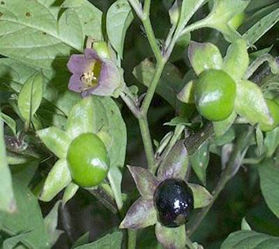|

| Botanical Name |
Atropa
belladonna |

|
| Common Name |
English:
deadly nightshade. |
| Family |
Solanaceae |
| Parts Used |
Whole
plants and roots |
| Medicinal Property |
A
narcotic herb that relieves spasms and reduces secretions of mouth,
bronchi and stomach. It used internally for asthma, kidney stones and
gallstones, Parkinsonís disease, myocardial infarction, hypo tension,
hyperacidity, gastric ulcers. Externally for rheumatic and muscular pain.
It also employed in ophthalmology, bradycardia, and psychiatry. |
| Chemistry |
All
plant parts contain alkaloids chiefly hyocyamine and little atropine and
hyoscine. Alkaloid contents vary from 0.13 to 0.7 %. Maximum total
alkaloid content is 0.8 % in seeds, 0.7 % in roots and 0.6 % in leaves. |
| Description |
Spreading perennial herb
reaches a height of about 1.5 m with a long, cylindrical, branched,
fleshy, creeping root. Roots are yellow brown externally and white within.
The leaves alternate, usually on the upper branches. Flowers are large
bell shaped, borne singly on the leaf axils. Fruits are globular to 1.25
cm.
|
| Distribution |
A. belladonna is native of
Central and Southern Europe. It is cultivated in different parts of the
world as well as in USA, UK, Germany, Poland, Russia and Hungary.
|
| Economics |
|
| Warning |
Raw
form is toxic |
|
|